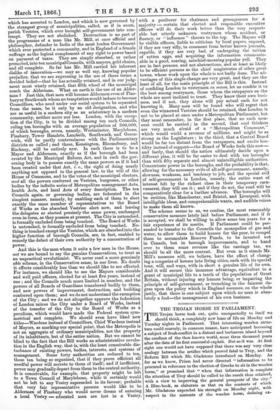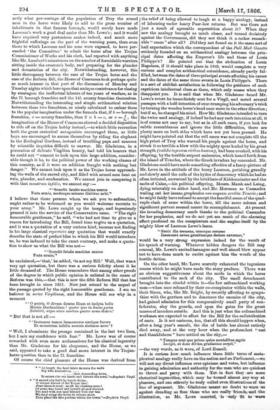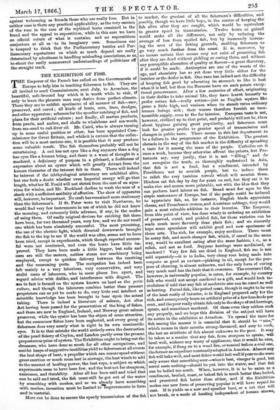THE TROJAN HORSE IN PARLIAMENT.
THE Trojan horse took out, quite unexpectedly to itself we should think, a completely new lease of life on Monday and Tuesday nights in Parliament. That interesting wooden struc- ture could scarcely, in common reason, have anticipated becoming a subject of fresh conflict in a distant and barbarous island beyond the confines of the then known world, some three thousand years after the date of its first successful exploit. But so it was. At first sight one would not have supposed that there was any very close analogy between the artifice which proved fatal to Troy, and the Reform Bill which Mr. Gladstone introduced on Monday. As far as we know, Priam had never directed " information to be procured in reference to the election of Greeks to sit in the wooden horse," or promised that " when that information is complete the attention of Troy should be called to the result thus attained, with a view to improving the general prospects' of the city." A Blue-book, as elaborate as that on the contents of which Mr. Gladstone expended his strength on Monday night, with respect to the contents of the wooden horse, defining ex-
actly what per-centage of the population of Troy the armed men in the horse were likely to -add to the gross number of inhabitants in that famous borough, would surely have made Laocoon's work a good deal easier than Mr. Lowe's ; and it would have required very portentous snakes indeed, and much more frightful sufferings on the part of the warning peers, than.even those to which Laocoon and his sons were exposed, to have per- suaded 'the Committee' to admit the horse after the Trojan Commissioner of Works and his clerk, had reported with anything like Mr. Lambert's minuteness on the number of formidablewarriors sitting inside the creature's body, and •preparing for the plunder and devastation of the city. Notwithstanding, however, this little discrepancy between the case of the Trojan horse and the ease of the Reform Bill, the House of Commons took perhaps quite as much interest in that part of the discussion of Monday and Tuesday nights which bore upon that antique contrivance for closing by stratagem the ineffectual labours of ten years of warfare, as in the 71. borough franchise and the 14/. county franchise themselves.
Notwithstanding the interesting and simple arithmetical relation between these two franchises, so nicely calculated to endear them
to the popular imagination under the formula that, if b = borough franchise, c = county franchise, then 2 x b = c, or c = 11-:, the
imagination of the House of Commons showed a decided disposition to ride off on the Trojan hobby instead,—to which little recreation both the great oratorical antagonists encouraged them, as little boys are encouraged to amuse themselves by riding the elephant in the Zoological Gardens, instead of troubling papa and mamma by scientific inquiries difficult to answer. Mr. Gladstone, in -a peroration of delicate Virgilian beauty, had told his hearers that
he could not " consent to look upon this large addition, consider- able though it be, to the political power of the working classes of this country, as if it were an addition fraught with nothing but danger." We cannot look upon it as the Trojan horse approach- ing the-walls of the sacred city, and filled with armed men bent on ruin, plunder, and confiscation. We cannot join in comparing it with that monstrum infelix, we cannot say :—
." Li:km[16ft fatally machine Timm Rata armis, media:slue minans illabitur I believe that those persons whom' we -ask you to enfranchise, ought rather to be welcomed as you would welcome recruits to your army." Mr. Lowe caught up the image, and ingeniously pressed it into the service of the Conservative cause. - " The right
honourable gentleman," he said, "who had not time -to give-us a reason for introducing the Bill, found time togive us a quotation, and it was a quotation of -a-very curious -kind, because not finding in his large classical repertoire any quotation that would exactly
describe the state of perfect bliss to which his Bill would introduce us, he was induced to take the exact contrary, and make a quota- tion to show us what the Bill• was not- " Scandit fatalia machina muros Fceta
he exclaimed,—'that,' he added, 4cis not my Bill.' Well, that wasa
very apt quotation, but there .was a curious felicity about it he little dreamed of. The House remembers that among other proofs of the degree in which public opinion is enlisted in the cause of Reform was this,—that this is now the fifth'Reform Bill that has been brought in since 1851. Now just attend to the sequel of the passage quoted by the right honourable gentleman. I am no believer in sortes Virgilianm, and the House will see why in a moment
" 0 patria, 0 ai. a. Ilium et inclyta hello Mamie Dardanidum ! quater ipso in limine porno; Substitit, atque utero sonitum quater area
at Bat that is not all :— " Instamns tamen immemores mecique furore Et monstrum infelix secrete sistimus arse.' t "Well, I abominate the presage contained in the last two lines, but I mix my confidence with fear." Mr. Lowe was of course rewarded with even more acclamations for his classical ingenuity than Mr. Gladstone for his eloquence, and the House, as we said, appeared to take a good deal more interest in the Trojan- horse question than in the 71. franchise.
Of course the chief pleasure of the House was derived from
"At length the fatal fabric mounts the walls Big with destruction.
. .then descending down,
it enters o'er ourheado and threats the tewn.!'—Drydaa's Virgil.
+- "0 ucred city built by hands divine,
0 valiant heroes of the Trojan line!
Four timesdi•auck ; .aa,oft the clashing sound
Of arms was beard and inward groans abound.
'Vet mad with real and blinded with our fate We haul along the horse in solemn state,
Then place-the dire portent within the tower."—Dryderr's Virgil. the relief of being allowed to laugh at a happy analogy, instead of labouring under heavy Poor-law returns. But was there not just a touch of agreeable superstition about it? When they saw the analogy brought so much closer, and turned decisively against the Government, did they not think it a rather remark- able " omen " after all? Did they not found on it the same sort of half expectation which the correspondent of the Pall. Mall Gazette evidently founded on an arithmetical analogy between the prin-
Cipal dates affecting the Emperor's life and those of Louis
Philippe's ? pointed out that the abdication of Louis Napoleon, if it should take place in 1869, would complete a very curious and complex arithmetical coincidence, already partly nil- filled, between the dates of threeprineipal events affecting his career and the dates of the same three events. in Louis Philippe's. There is a sort of childish satisfaction in following the guidance of such capricious intellectual clues as these, which only ceases when they disappoint you. It is said that when Mr. Gladstone . heard Mr. Lowe's retort he immediately sent for a Virgil, and noted •several passages with a half-intention of over-trumping his adversary's trick by turning the wooden horse's head once more in the other -direction ; but if so, he changed his mind. How Mr. Gladstone intended to turn the twice used analogy, if indeed' he had any such intention at all, it is of course not easy to say; but as in all such cases, if you look for subtle resemblances and ignore the • little difficulties, there are plenty more on both sides which have not yet been pressed. He might have pointed out that the evil omen was not complete tEl the high priest of Troy who warned his people against the horse, and struck it so terrible a blow with the mighty spear hurled by his great strength (validis ingentem viribus hastam), had been crushed, with his offspring, by the terrible serpent emissaries, which issued forth from the island of Tenedos, where the Greek invaders lay concealed. Mr. Gladstone could have made-something effective of a fancy-picture of Mr. Lowe in the attitude of the hoary Laocoon,.perishing_grandly and slowly amid the coils of the hydra of democracy whichhe had so often irritated, .unwarned by the brickbats of Kidderminster and the mobs of Calne,--his political offspring, Messrs. Marsh and Laing, dying miserably on either hand, and..Mr. Horsman as Cassandra wailing out her insane_propheeies monunquam oredita Teucris ; and he might fairly have refused to-accept the fanciful omen of the quad- ruple clash of -arms 'within. the horse, till the more solemn and significant portent seemed nearer its accomplishment. At present the.invading democracy sends thanks to the . political Cassandra for her prophecies, and we do not yet see much of the alarming effect produced on Abe conspirators and-Lie engine .itself by the mighty blow of Laocoon Lowe's lance.
" Stetit ilia tremens, nteroquo recusso Insonuere eavaa_genxittunque dedere csvernse," would be a'very strong expression indeed for the -"result of his speech of warning. Whatever hidden dangers the Bill may conceal, Mr. Lowe's excited harangue and well aimed blow appear not to have done much to excite against him the wrath of the hostile deities.
On the other hand, ltIr.'Lowe scarcely exhausted the ingenious
omens which he might have made the story produce. There was an obvious suggestiveness about the mode in which the horse contributed to the sack of the city. The small detachment brought into.the citadel within it—the few enfranchised working men—when once released by their co-conspirator within the walls, their Sinon, who, like Mr. Bright, by recently affecting to sympa- thize with the garrison and to denounce the enemies of the city, had: gained admission for this comparatively small party of con- federates, -slay the guards, and open the gates for the great masses of invaders outside. And this is just what the enfranchised workmen are expected to effect for the Bill for the redistribution of seats. Is it not ominous,. too, that all this should happen when, after a long -,year's assault, the din of battle has almost entirely died away, and at the very hour when the profoundest "rest and thankfulness " have settled on the dty,—
" Tempus erat quo prima quies mortalibus sogris Incipit, et done divam gratissime serpit," —the very words, as it were, of Lord Russell.
It is curious how much influence these little turns of meta- phorical analogy really have on the nation and on Parliament,—we will not say direct influence over opinions and votes, but influence in gaining admiration and authority for the men who are quickest to thrust and parry with them. Yet in fact they - are mere rhetorical ingenuities, which may be turned almost any way at pleasure, and can scarcely be truly called even illustrations of the line of argument. Mr. Gladstone meant no doubt to warn us against dreading as foes those who are really friends, and the illustration, as Mr. Lowe asserted, is --only fit to warn
against welcoming as friends those who are really foes. But in neither ease is there any practical applicability, as the very essence of the ruse in the case of the mythical horse consisted in the fraud and the appeal to superstition, while in this case we have an official return of what it contains, and no superstitious conjecture at all as • to its imaginary uses. Sometimes one is tempted to think that the Parliamentary battles and Par- liamentary reputations on which so -much depend are really determined by adroitness in -handling misleading associations, so as, to shunt the easily manceuvred understandings of politibians off the straight track.
































 Previous page
Previous page